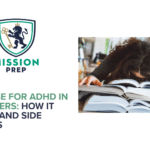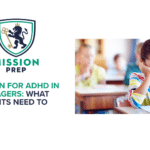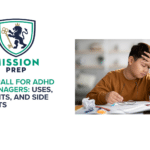Stimulants for ADHD in Teens: How They Work

ADHD might feel like a private struggle, but around 11.4% of children in the United States were diagnosed with ADHD in 2022.¹ To put it another way, that’s approximately seven million young people nationwide.
ADHD might show up early – sometimes before age 12, and for some kids, as young as 3 – but it often makes the loudest entrance during the teenage years.² This is when school demands pile up, friendships become complicated, and emotions run high. So it’s also when symptoms like trouble focusing, acting on impulse, and constant restlessness start leaving noticeable marks on grades, relationships, and home life.
Figuring out if a teen has ADHD isn’t something that happens in a single visit with a healthcare provider. These providers typically take their time, speaking with parents and teachers, listening directly to the teen’s experience, and using psychological and behavioral assessments before determining if ADHD is present.³
For teens who are diagnosed, stimulant medications sometimes become part of the treatment plan.⁴ But how do ADHD medications for teens with hyperactivity actually work? And, with so much to consider, how can parents know if they’re making the right choice for their child?
Mission Prep can walk parents and teens through the option of stimulants for treating ADHD in teenagers. This page can also work as a useful guide, discussing…
- How stimulant medications help teens better manage ADHD symptoms
- The most commonly prescribed stimulants and how each works in the brain
- What parents should understand about both short-term and long-term side effects
- How stimulant medications may influence sleep habits, appetite, and anxiety levels
- The risks that could come with long-term stimulant use
- What stimulant withdrawal may look like and how to help teens through it safely
- Why some teenagers misuse stimulants for academic pressure and performance
- How to know if stimulant medication is the right approach for your teen’s mental health care
- Where to turn for trusted professional support

How Do Stimulant Medications Help Teens With ADHD?
There are a few differences between a neurotypical brain and an ADHD brain.⁵ These differences include brain structure and function, as well as how the brain develops. For instance, sometimes, the ADHD brain develops more slowly in certain areas. Some regions might stay quieter, while others seem to work overtime just to keep up. Researchers have looked at this pattern and suggest that it might explain why focusing on or finishing tasks feels so difficult for teens with ADHD.
Sometimes, stimulants for treating ADHD in teenagers can make a difference. These medicines help the brain increase two important chemicals: dopamine and norepinephrine.⁶ Both play a big role in helping with focus, motivation, and managing emotions.
When these chemicals run low, even simple tasks can feel like a struggle. For example, starting something might feel like a battle – yet finishing it feels even harder. Thoughts might bounce around, rarely allowing the mind to settle on just one thing. Stimulants help create space in all this mental noise. They give the brain a chance to slow down and stick with whatever needs to get done.
With time, some teens say they find it easier to focus due to stimulants. School feels a little more manageable. Life at home sometimes gets calmer, too. These changes often help build confidence and improve how teens handle everyday challenges.
At Mission Prep, we help parents understand stimulant medications and their effects on teens before any medication is prescribed. The choice always comes down to a teen’s unique experience, struggles, and opinions.
Best Stimulant Medications for ADHD in Teens
The best stimulants for ADHD in teens depend on which challenges a teen faces most often. There’s no one-size-fits-all medication. Teen mental health treatment with stimulants often include:
- Adderall: Using stimulants for teen impulsivity often involves Adderall. It comes in versions that either work for a few hours or stay active through the full day.
- Vyvanse: This is a longer-acting option that often helps with emotional control and impulsivity. Its slow, steady release can also lower the chance of misuse.
- Ritalin: Ritalin starts working quickly and wears off relatively fast. This may help teens who only need support during certain times, like during morning classes or homework hours.
- Concerta: This medication stays active longer and helps teens who struggle to stay focused across the entire day.
At Mission Prep, our providers help families decide if stimulants are the right choice and which option might be most helpful. We also closely monitor a teen’s emotional and physical reaction to medication and make changes when needed.
Side Effects of Stimulants in Adolescents
Stimulant medications can be useful for managing ADHD, though side effects sometimes appear along the way.⁷ Some of these side effects could show up soon after starting a new medication, while others might take more time. For this reason, stimulant medications and their effects on teens should be carefully monitored.
Short-term side effects of stimulants in adolescents could include:
Difficulty falling or staying asleep
- Changes in appetite, often eating less than usual
- Headaches
- Upset stomach
- Feeling more anxious or easily irritated
These early side effects of using stimulants for treating ADHD in teenagers often settle after a little while. If they stick around, it may help to talk with your provider about adjusting the dose or trying something else.
Possible long-term side effects of stimulants in adolescents include:
Slower growth, either in height or weight ⁸
- Slight increases in heart rate or blood pressure
- Mood changes that last longer than expected
If something feels “off” or concerning regarding chosen stimulant medications and their effects on teens, it’s always a good idea for families to reach out. Providers at Mission Prep stay involved and encourage regular check-ins to make sure teen mental health treatment with stimulants continues to feel right for each teen. We’re dedicated to ensuring that the risks of long-term stimulant use in teens are understood and monitored.
The following information goes into a little more depth on three common side effects of stimulants and how to manage them: sleep disturbances, weight loss, and anxiety.
Why Stimulants Can Cause Sleep Disturbances in Teens
There are links between taking stimulants and sleep disturbances in teens. Many teens take medications like Ritalin, Vyvanse, Adderall, or Concerta to help with focus, and during the day, this extra alertness feels useful. But when evening comes, the mind might still feel too active. For this reason, some teens mention having a harder time falling asleep or waking up more often throughout the night.
It sometimes helps to take the medication earlier in the day to avoid disturbed sleep. Alternatively, some feel better using a version that fades faster, while others find value in adjusting their routines. For instance, incorporating simple nighttime habits like reading a book or listening to calming music can make a difference when it’s time to wind down.
Why Stimulant Medication Can Lead to Weight Loss in Teens
Teens taking stimulant medications sometimes eat less without even realizing it. The medication can change how the brain picks up on hunger, so even though their bodies need food, they don’t always feel that familiar reminder to eat. Over time, this can lead to noticeable weight changes or slower growth.
To manage stimulant medication and weight loss in teens, it can help to offer small meals during times when appetite naturally returns. For instance, breakfast time and later in the evening tend to work best. Some parents also find that simple snacks like smoothies or peanut butter help teens boost their nutrition without making them feel too full.
If eating patterns don’t pick up or weight keeps dropping, the care team at Mission Prep can look at what’s working and what’s not, and help adjust things to better support healthy growth.
Stimulants and ADHD-Related Anxiety in Teens
Using stimulants for treating ADHD-related anxiety in teens can lead to improved focus and help reduce anxious thoughts as tasks begin to feel easier to manage. Plus, when teens experience less frustration, their anxiety often also decreases.⁹
On the other hand, some teens might feel more restless or unsettled after starting stimulant medication. This response happens when increased brain activity heightens feelings of tension rather than calming them. Teens who already struggle with anxiety before starting medication are more likely to notice this effect.
Stimulants help most when anxiety results from difficulties staying organized or keeping up with responsibilities. When anxiety comes from other sources or increases after starting medication, the mental health team works with families to review and adjust the treatment approach. At Mission Prep, the focus remains on supporting both attention and emotional well-being throughout care.
Recognizing Stimulant Withdrawal Symptoms in Teens

When a teen misses a dose of stimulant medication or stops taking it suddenly, changes in mood and energy often show up first. Some teens may feel more tired than usual, while others might seem irritable or restless. It also becomes harder to focus, and tasks can start to feel overwhelming again.
Physical stimulant withdrawal symptoms in teens sometimes also appear. Headaches, stomachaches, or low energy can show up as the medication leaves the system. These feelings usually pass with time, but they can feel uncomfortable in the moment. You can always reach out to your provider if you have concerns.
If stopping the medication is part of a treatment plan, it’s important to do it gradually and under the guidance of a mental health professional. This approach helps reduce uncomfortable symptoms and gives the brain time to adjust.
Are Teenagers Using Stimulants for Academic Performance?
It’s not uncommon to hear of teenagers using stimulants for academic performance. For instance, some teens might try stimulant medications without a prescription to handle busy school schedules or long nights of studying. This usually happens when the pressure to keep up feels high. Yet, while it might seem like an easy way to stay focused, using these medications without medical support can create more problems than it solves.
Teens who go this route often feel restless and have trouble sleeping. Mood changes also might show up, making it harder to stay calm when stress builds. Over time, focusing without the medication feels more difficult, and the cycle repeats.
Managing academic stress works better when study time feels more balanced. Short breaks, regular meals, and small changes to daily routines help the brain stay focused without adding more pressure.
At Mission Prep, we can help teens facing academic pressure find more manageable ways of handling their stress and busy schedules without turning to stimulant medications that aren’t necessary.
When Are Stimulants the Right Choice for Teen Mental Health Treatment?
Deciding whether stimulant medication is the right step starts with understanding what a teen needs help managing. These medications support focus and attention, and often help teens who feel frustrated by falling behind or struggling to stay organized.
Stimulants work best when attention problems or impulsive behaviors get in the way of school, friendships, and daily routines. If a teen tries their best to focus but still feels stuck, or if finishing even small tasks feels overwhelming, medication might offer extra support.
It also helps to think about the teen’s mental health goals. Some may want to feel more confident in class. Others might need help staying calm in social situations or managing emotional outbursts. Talking through these goals with a mental health professional helps create a plan that supports both emotional well-being and success in daily life.
Medication is only one part of the bigger picture. When it works alongside therapy, healthy routines, and emotional support, it often leads to positive and lasting changes.
Reach Out to Mission Prep for Teen ADHD Support
Supporting a teen with ADHD often starts with learning more about what’s really happening day to day. At Mission Prep, our team takes time to understand what each teen finds difficult and where they want to feel stronger. Some teens need help with focus, while others struggle more with emotions or daily routines.
Our team looks at everything together: how managing ADHD in teens with stimulants might help, and how therapy and healthier habits could work. When things start to feel overwhelming, it helps to know there’s a place that understands what teens face and how to help them move forward.
For more advice on ADHD medications for teens with hyperactivity and guidance on taking the next step, reach out to us today.

References
- Centers for Disease Control and Prevention. (2024, November 18). Data and statistics on ADHD. U.S. Department of Health and Human Services. https://www.cdc.gov/adhd/data/index.html
- National Institute of Mental Health. (2024, August). Attention-deficit/hyperactivity disorder: What you need to know. U.S. Department of Health and Human Services, National Institutes of Health. https://www.nimh.nih.gov/health/publications/attention-deficit-hyperactivity-disorder-what-you-need-to-know
- Wolraich, M. L., Hagan, J. F., Allan, C., Chan, E., Davison, D., Earls, M. & Zurhellen, W. (2019). Clinical practice guideline for the diagnosis, evaluation, and treatment of attention-deficit/hyperactivity disorder in children and adolescents. Pediatrics, 144(4), e20192528. https://pmc.ncbi.nlm.nih.gov/articles/PMC7067282
- Stevens, J. R., Wilens, T. E., & Stern, T. A. (2013). Using stimulants for Attention-Deficit/Hyperactivity Disorder. The Primary Care Companion for CNS Disorders. https://pmc.ncbi.nlm.nih.gov/articles/PMC3733520/
- Cronkleton, E. (2021, August 13). What are the differences between an ADHD brain and a neurotypical brain. https://www.medicalnewstoday.com/articles/adhd-brain-vs-normal-brain#:~:text=Research%20shows%20that%20in%20people,learning%20from%20past%20mistakes
- MacDonald, H. J., Kleppe, R., Szigetvari, P. D., & Haavik, J. (2024). The dopamine hypothesis for ADHD: An evaluation of evidence accumulated from human studies and animal models. Frontiers in Psychiatry, 15. https://doi.org/10.3389/fpsyt.2024.1492126
- Graham, J., & Coghill, D. (2008). Adverse effects of pharmacotherapies for Attention-Deficit Hyperactivity Disorder. CNS Drugs, 22(3), 213–237. https://doi.org/10.2165/00023210-200822030-00003
- Goldman, R. D. (2010, February 1). ADHD stimulants and their effect on height in children. https://pmc.ncbi.nlm.nih.gov/articles/PMC2821235/#:~:text=The%20investigators%20concluded%20that%20treatment,a%20positive%20effect%20on%20height.&text=As%20to%20a%20potential%20dose,course%20of%20treatment%20for%20children
- Kritchman, M., Koubi, M., Bloch, A. M., & Bloch, Y. (2019). Effect of methylphenidate on state anxiety in children with ADHD-A single dose, placebo controlled, crossover study. Frontiers in Behavioral Neuroscience, 13. https://doi.org/10.3389/fnbeh.2019.00106



















